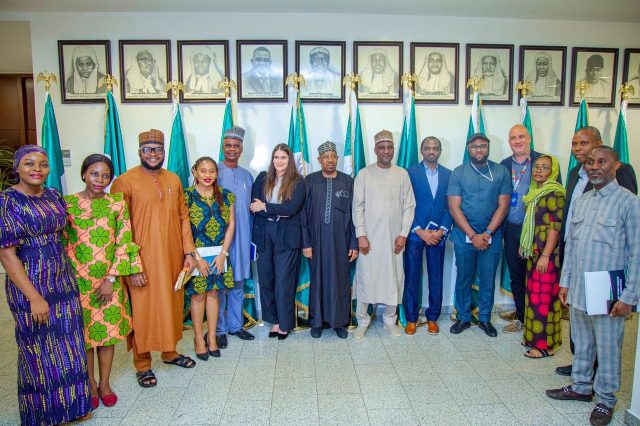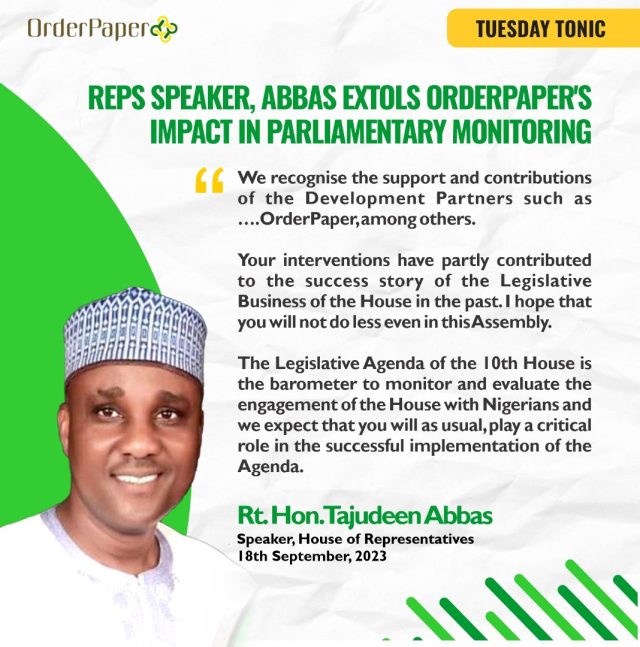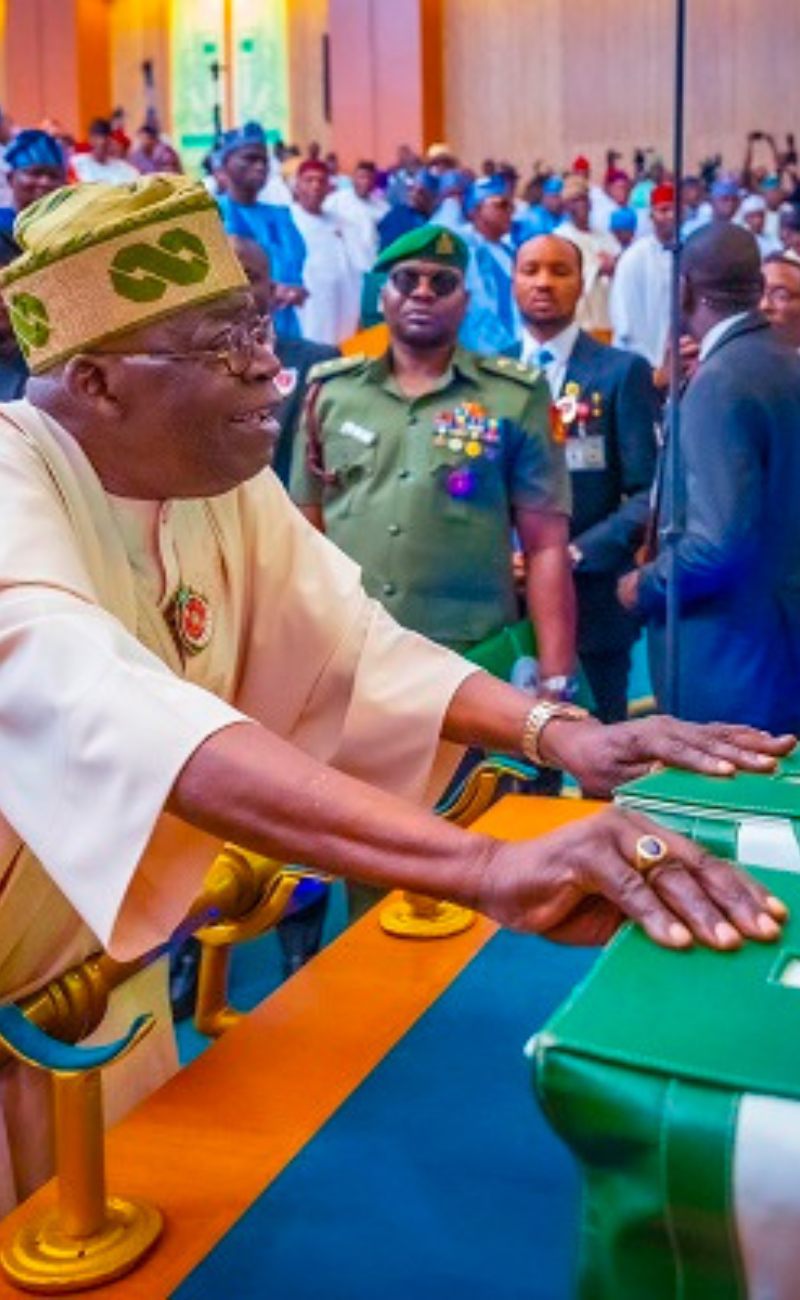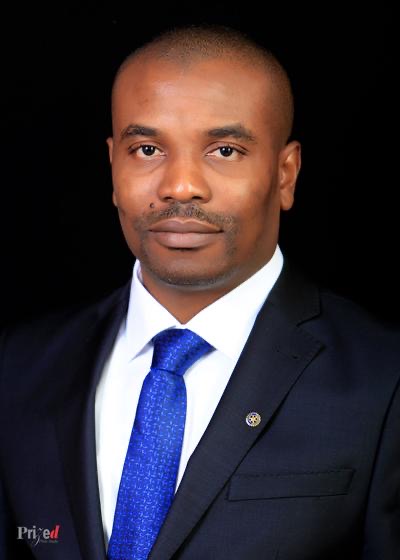The Speaker acknowledged the technical support and contributions provided to the National Assembly by OrderPaper and other development partners, which he noted have partly contributed to the success story of the Legislative Business of the House in the past.

The Speaker of the House of Representatives, Rep. Tajudeen Abbas, has reiterated the commitment of the House to collaborate with development partners towards the successful implementation of the Legislative Agenda and an improved National Assembly.
Abbas made the commitment on Monday during an interactive meeting with Development Partners and Technical Support Organisations in Abuja.
He said the interactive meeting was to provide an opportunity to share ideas and updates on contributions and support for capacity development for legislators and staff, as has been done in the past.
According to him, capacity development in the 10th House is very necessary given the high turnover rate of members and aides, as well as the need for enhanced and effective service delivery.
READ ALSO: IDD 2023: Prof Sonaiya seeks urgent review of timeline for Election Petitions
”One of my cardinal policy thrusts, on assumption of office as Speaker of the House, is capacity development for Members and Staff of the House of Representatives.
This has become more imperative following the high turnover rate of the 10th House of Representatives, where we have over two hundred new Members with hundreds of Legislative Aides. This number of Members and Aides requires improved capacity to cope with the office’s demands. Hence, institutional capacity development is considered one of the priority components of the Legislative Agenda of the 10th House,” the Speaker said.
The Speaker, who also observed that some of the partners have, over the years, engaged different committees without a coordinated approach, informed that the 10th House will ensure proper coordination of such engagement and support.
“The assumption is that each development partner has its own area of focus for which budgetary provisions would have been made, and their representatives in Nigeria would engage the relevant committees of the House in that regard. While that support is greatly appreciated, there is a need for coordination in the 10th House because of our peculiar challenge of capacity gaps,” he noted.
Furthermore, Abbas said the issues of Women in Parliament and Inclusion in Governance, Youth Empowerment, Constitution Review, Electoral Review, and Institution building as contained in the Legislative Agenda are meant to reinforce the legislative actions that started in the 9th House.
He equally noted that additional committees were created to deepen citizens’ engagement just as the number of parliamentary allies has been increased to deepen relations with other parliaments.
READ ALSO: Shehu Sani insists on bills, oversight as performance indicators for lawmakers
“We have recently added some Standing Committees to strengthen engagement with the people. We now have Committees on State and Local Government, Traditional Institutions, and Petroleum Resources (Training Funds). We have also further increased the number of Parliamentary Friendship Groups to deepen relations with other parliaments to share knowledge and experiences in parliamentary practice and promote good governance.
To underscore our disposition to serve Nigerians, we created a Committee on Monitoring and Evaluation of the Implementation of the Legislative Agenda as part of our internal mechanism to enforce compliance and also a Committee on Monitoring and Evaluation of the Standing Committees to ensure that there is efficiency and accountability in the business of the House,” he stated.

While commending the development partners for playing a part in the success story of legislative activities over the years, the Speaker expressed hope that the organisations will do more for the 10th House.
“It is important to acknowledge the technical support some of you have been providing for the National Assembly. We recognise the support and contributions of the Development Partners, such as OrderPaper, the Policy and Legal Advocacy Centre (PLAC), the Department for International Development (DFID), the Foreign, Commonwealth and Development Office (FCDO), Konrade-Adenauer Foundation (KAS), United Nations Development Programme (UNDP), Partnership to Engage, Reform And Learn (PERL), the Civil Society Legislative Advocacy (CISLAC), International Community on Red Cross (ICRC), among others.
Your interventions have partly contributed to the success story of the Legislative Business of the House in the past. I hope that you will not do less even in this Assembly. The Legislative Agenda of the 10th House is the barometer to monitor and evaluate the engagement of the House with Nigerians, and we expect that you will, as usual, play a critical role in the successful implementation of the Agenda,” Abbas said.
READ ALSO: OrderPaper to Undergraduates: “Prioritise legislative accountability to get future you desire”
Also, the Senior Programme Executive, OrderPaper Advocacy Initiative, Regina Udo, recounted the organisations’ efforts in ensuring citizens’ engagement, transparency, and accountability in other sectors of the economy, adding that more collaborations can be done with the 10th House.
“In the Ninth National Assembly, we collaborated with both the Senate and House of Representatives Public Accounts Committee (PAC); we have had a colloquium with Host Communities in the Niger Delta as regards remittance in revenue generation in the oil and gas sector. We can both collaborate in terms of ensuring transparency and accountability in the oil and gas sector and also in terms of the anti-corruption crusade.
And we have also organized town hall meetings where lawmakers also engaged with citizens to chart the way forward on legislative processes. We are also looking at collaborating with you in electoral and constitutional reforms moving forward. Our open door policy at OrderPaper is to collaborate with you in the areas mentioned in terms of capacity building and knowledge product for the research that we do in the National Assembly from time to time,” Ms Udo said.
In his response, the representative of the British High Commission, Chris Okeke, expressed the commission’s commitment to promoting the involvement of women and youths in elections and the electoral process and assured that it would continue to work with the National Assembly towards strengthening Democracy in Nigeria.
“Our goal really is to support you and the National Assembly with building democratic and accountable instinct that works for Nigerians,” he said.
Resident Representative of Konrad Adenauer Stiftung, Marija Peran, commended the Speaker for seeking to work with development partners and assured that KAS will continue to collaborate with the House in the area of capacity building.



